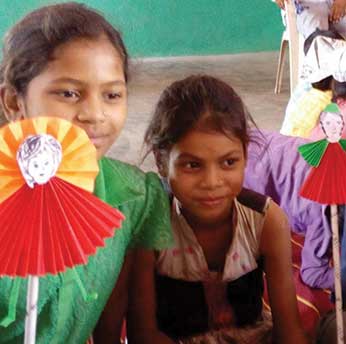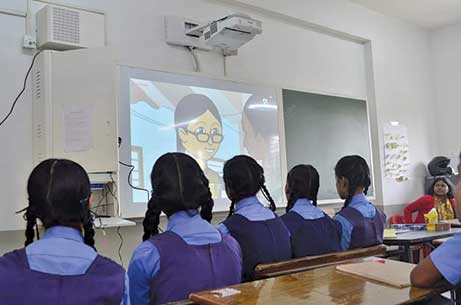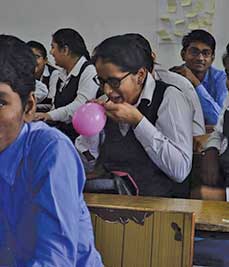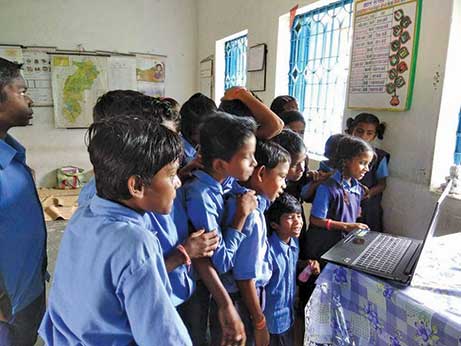Children from the deprived communities continue to struggle to get through and go to the next level in their educational endeavours despite positive discrimination policies of governments. They face both economic and social hurdles from other communities as well as their own. It is support from family, youth groups, friends, and teachers that helps them cross these hurdles.
In this article, we will read about the educational experiences of two young people, a Munda-Oraon woman and a Mahar man. Such stories will help us understand their lives and struggles better and also identify the support systems that help them so that we as teachers and society can put in place more such systems.
Nora Samand
I am a tribal from Jharkhand, an only child of Oraon and Munda parents. My father belonged to the Munda tribe and my mother was from the Oraon tribe. I was born in a small town called Manoharpur in Jharkhand.
The Mundas had their homes in a locality of their own, away from where the Oraons lived. The churches of the Oraons and the Mundas were also separate. My father, though, was against all this and would mingle with everyone. A teacher drawn to the principles of Christianity, my father used to teach the children of the village during the week and preach on Sundays. My parents knew from experience that education is important for a good life.

I was initially admitted to a local Hindi church school. Later, my father’s friend, a doctor, told him of a good convent school, where the fees were minimal. I studied in this school until I finished my matriculation. Neither my parents nor I were really aware of where I could go next. With little money and no information, the best I could do was get admission in a college in Ranchi, where I did my intermediate in arts.
My father’s deep fascination for Christianity led me to the Theological Seminary or Bible school in Dehradun. There I understood that Christianity is embraced by people other than tribals also and that we were a minority in a minority religion. The Seminary helped me understand the need for service and that it is not easy to inculcate a culture of service in people.
Studying in a Bible school was a refreshing beginning to a very different life. Though a lot of emphasis was on academic grades, people were kind. It was here that I learnt that within the Christian community, tribal Christian was a different identity. For the first time, I came across the term ‘Dalit Christian’, but I was too young to give it any serious thought. During my fourth year here, my mother was diagnosed with Schizophrenia. So I returned home and began working for a Christian organization. My work involved translating books, visiting schools, and distributing toys to the children there.
My mother came from an impoverished background and understood the importance of financial independence for women. So when I was home taking care of her and working for the NGO, she constantly urged me to find a more permanent job. It was at this point that I came across a newspaper ad that said that the Government of Jharkhand was giving free training to anyone who wanted to pursue a career in aviation or nursing. I opted to train in the aviation sector, but my mother’s ill health did not let me focus on the training and I dropped the idea of working in the aviation sector. I then enrolled for graduation in Literature but left that as well mid-way because of my mother’s health. I later completed a mass communication degree from St. Xavier’s in Ranchi. My friend then suggested that I apply to the Tata Institute of Social Sciences (TISS) because I was keen on working for the upliftment of tribal communities like mine. I applied and joined the MA Elementary Education course. Being a tribal, I got support for my education in TISS. TISS helped me gain an altogether different perspective.
My experiences as a tribal Christian have never been outright negative, but people have behaved differently with me even if only subtly. TISS changed me as a person. I could see things from a different lens, the degree of discrimination and marginalization that takes place and how social scientists are trying to understand and address these problems. I had not heard of Phule or Ambedkar earlier and I was quite inspired by their work.
After TISS, some of my classmates, seeing my inclination to stand for justice, suggested that I apply to a program in Noamundi run by Eklavya, an NGO. Constant push from friends led me to try Eklavya and I got posted to a library program in Noamundi (a small hamlet in West Singhbhum). After working here for a short while, I got the chance to work in Chhatisgarh. This was my first experience meeting people from the Gond tribe. I worked there for two years and unlike the picture the media paints about the place being Naxal affected, I did not face any threat. Teachers, especially, were very supportive.

There exists a lot of apathy in the system which is the reason why the Gonds of Bastar have still not been able to move upwards socially. I had the chance to get to know tribals from the North East and Central India. Tribal people need to think big. A lot of their concerns are very petty. They need to understand that if they focus on the bigger fights, petty concerns will resolve themselves. For example, malnutrition, health, early marriages are major issues. But the educated among the tribals don’t think about these issues, their concerns stop at not marrying from another tribe or trying to uplift just their own tribe. This small vision will not take them anywhere as a community, which is already struggling to survive.
I lost my father while I was working in Chhattisgarh. I was only 28 then. My father kept encouraging me to continue working. He used to be so happy when I would send him medicines I bought with my salary. Even my mother, in spite of her schizophrenia, encouraged me to be independent. I lost her too, a few years ago. I miss them both. My parents were happy that I was independent. If not for their support, I would not have got the confidence I have today.
I plan to open a school or education centre to help children and a centre for recreation for women labourers in my Village in their memory. I would also like to study and do research to help my community.
Nitin Kumar*
My father and mother were Mahars from Itgaon, a village near Nagpur. We had two acres of land where my grandfather’s family did vegetable farming. We moved to Nagpur because we could not sustain the farm. My father had to give up farming and work in a private company as a labourer.
My father wanted his children to go to an English medium school, but we could not afford the fees. So he sent us to a private ‘English medium’ school, where not even the teachers knew how to speak in English. Our experiences in this school were not good. The teachers would only read out the lesson and ask us to memorize the questions and answers.
Except for Hindi and Marathi, all other books were in English. Teachers wouldn’t allow us to speak in our mother tongue, they forced us to speak in Hindi. The school belonged to the Sindhi community and almost all the teachers were from the upper castes. Those children who joined tuition classes that the teachers from our school held would get exam questions in advance, allowing them to score more marks. There were Sikh, Muslim, upper caste Hindu and a few Dalit students in the school.
I completed class 7 in this school without learning much. Paying school and tuition fees was difficult for my father, so he admitted me to a semi-English medium government high school. This school was located in the middle of the city and was also quite popular. All the teachers of this school belonged to the upper castes and students were from scheduled caste, scheduled tribe, and backward class communities. This school was well-equipped with a library, science labs, computer rooms, etc. There were regular classes and both teachers and students were disciplined.
I had never imagined such a school before. Many students were good at studies, but they also looked down on those who weren’t so good. On my first day in this school, I chose to sit in the first row. Some of my classmates asked me how many marks I had scored in my previous class. My 62 percent apparently qualified me only for the last rows. I was very sad and went to the last row.
Because my previous school experience had been bad, I used to sit quietly in class. I was afraid that children would make fun of me. I was not able to cope with the studies; gradually all my friends left me and I was alone. I didn’t like to go to school. I used to sit in a park instead of going to school and would return home at the time school got over. I was afraid of the math teacher because he used to teach less and beat me more.
However, by class 9 I had succeeded in reading and understanding English a little. I could also read and write Marathi properly but I was weak in mathematics. This continued till class 10 and I failed in English. Disappointed I told my father that I won’t study further, so he sent me to a tailor’s shop to work. This became my daily routine. After a few days, a cousin took me to a school teacher named Wankhede, who insisted that I write my class 10 exams again.
Wankhede sir encouraged me to come for tuition every morning. When two months were left for the exam, I used to go for tuition every day and study for an hour after returning home from work in the evening. I was enjoying studying with Wankhede sir because I was able to understand everything he was teaching and there was no scolding. I passed my exams in the first attempt! This improved my confidence.
After I finished class 10, I joined a private aided intermediate college run by a Buddhist society and took up humanities. I also got a scholarship for my studies. I attended college regularly while continuing working at the tailor shop. It was a good college with dedicated teachers and a variety of students. Whatever was taught was easy to understand. My friends and I used to study together and help each other. We were all from deprived communities. We used to study in the community library, this helped us learn from each other.

It is in this college and community library that I learnt about Ambedkar and Buddhism. Before this I had not read about Buddha or Ambedkar. In college, teachers used to discuss the teachings of Buddha and Ambedkar, which inspired us. We used to listen to the discussion of the Ambedkarite youth at the community library and learn about our society. Sometimes we used to attend meetings of the Ambedkarite youth. Through these discussions, we realized our responsibility towards our society.
Due to the company of good teachers and friends, I was able to attain third rank in my intermediate. I was very happy because such good marks were the result of the commitment of teachers, good friends, and my hard work.
After my intermediate, I was thinking of becoming a teacher but since the fees for D. Ed. was quite high, I could not afford to do D. Ed. At this time I came to know about social work from a relative and got interested in it. I completed my bachelor’s degree in social work.
In college I had a group of friends. Together we were active in academic and other events. We also joined and became active in the Ambedkarite Party of India. Our contacts and friend circle now went beyond Nagpur. Some friends informed us about the prestigious universities we could apply to. There was a group named National Network of Buddhist Youth (NNBY) in college. This group inspired and prepared us for examinations. We joined this group and became its active members. In these meetings we used to discuss about national and international issues, learn English, prepare for interviews, etc. I came to know about the Tata Institute of Social Sciences from NNBY and decided to join it. I could not succeed in the first attempt, so I worked hard for one more year. This time I succeeded in getting admission in the category reserved for SCs. I also got a fee waiver and stipend. It made me independent. I would no longer be a burden on my parents.
I was the first boy in my family to get admission in a reputed university. Everyone at home was very happy, but also a little worried about how I would live among strangers in Mumbai. This was my first experience outside Nagpur.
University life was quite different and fascinating with most students from well-educated and well-to-do families. Sometimes I felt out of place. In graduation, I had gained a place among good students. Here, I was challenged again.
Out of 40 students in my class, three of us were Mahars (SC), two were tribals, and the rest were upper caste. At first, the upper caste students kept a distance from us. So the 4-5 of us remained isolated. The attitude of teachers was also indifferent towards us. Because we were there on reservation, we were not treated equally. I was quite disappointed. I felt like leaving and returning home. But my father and my friend encouraged me. Somehow, I managed to stay and continue. Seeing the classroom environment getting worse, some students from upper caste and backward castes raised their voice against discrimination. We supported them and by the second semester and situation was better. Still, there were groups of students who would consider themselves superior to us.

By the second semester I became friends with the students of the campus, I used to live on the campus. I got opportunities to learn a lot. Seminars, workshops, student politics, and social activities were all great learning experiences. Though the course was partly in person and partly online, some of us, scholarship students got the facility to stay on campus through the year. We also got a personal mentor for helping us in our assignments as we had to write in English.
TISS was a great experience. Friends helped a lot both financially and academically, but it also brought me some bitter experiences. Some upper caste teachers would not allow us to speak. Once, when I answered in Hindi with encouragement from a friend, both teacher and students started laughing! In spite of all this, I successfully completed my post graduation. I started searching for jobs. I approached my seniors and they told me about projects run by the university professors. I met a few professors and they offered me one project. I accepted it. I did this project for 15 days and earned enough for a few months. Then my colleague told me about a science education project that TISS was doing with another organization in Chhattisgarh that needed short-term volunteers. I joined this project and worked for 15 days. After this there was a year long position in the same organization as a project assistant. I applied and got selected. I was happy and started working there. I spent around 2.5 years at this organization and learned a lot. The coordinator and many of my colleagues were very supportive and taught me many things. Due to this I now have a good job in a reputed organization. But as in TISS, there is discrimination here too.
While working in different organizations I faced discrimination on the grounds of caste and class from many. I have also met people who have felt sorry for me. Neither is acceptable. People judge you by your caste and class rather than your abilities. Often, you have to prove that you are capable. I am still afraid of revealing my caste. I do my best in whatever opportunity I get, but I have to overcome the caste barrier all the time. Many avoid taking up caste issues and many are openly against caste based benefits. But in my life, the opportunities I got because of these benefits social, economic, and personal, have made me independent and I am able to contribute to the upliftment of people like me.
Translation support Sundar Singh. Composition Anjali Noronha.
(*name changed, on request)
